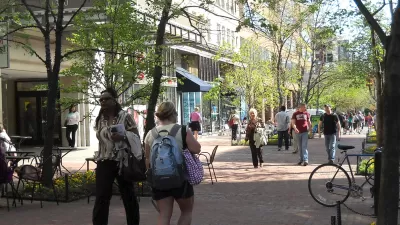Integrated food systems planning is a cornerstone of efforts to create healthy and sustainable communities across America. Kimberley Hodgson summarizes recent research conducted by the APA that evaluates which communities are leading the way.
Access to food is a basic human right, and a critical aspect of building a sustainable healthy community. However a recent APA study has revealed that "only 105 jurisdictions in the U.S. explicitly address an aspect of local or regional food systems in their comprehensive plans or sustainability plans,"
In an effort to spotlight those communities that have taken, "important steps to connect local food system–related issues to economic, social, and ecological goals," recent APA research has focused on identifying which communities are leading the way in food systems planning and the ways in which their work can inform the many cities who will follow their trailblazing path.
According to research conducted by APA's Planning and Community Health Research Center, "The top five highest-scoring plans included Marin County, California's comprehensive plan; Philadelphia's sustainability plan; San Francisco's sustainability plan; Sacramento's comprehensive plan; and Baltimore's sustainability plan."
"All of these plans included explicit goals and policies to improve food access equity within the context of the larger community food system, but also addressed how to implement each food-related policy outlined in the plan and how to monitor and track progress in achieving the plan's food goals."
In her summary of the research, Hodgson shares the 10 main steps a local government can take to effectively plan for healthier, more sustainable local and regional food systems.
This summer, APA will publish a policy report to share the complete results of the study.
FULL STORY: Food Access: The Missing Sustainability Planning Topic?

Alabama: Trump Terminates Settlements for Black Communities Harmed By Raw Sewage
Trump deemed the landmark civil rights agreement “illegal DEI and environmental justice policy.”

Study: Maui’s Plan to Convert Vacation Rentals to Long-Term Housing Could Cause Nearly $1 Billion Economic Loss
The plan would reduce visitor accommodation by 25% resulting in 1,900 jobs lost.

Planetizen Federal Action Tracker
A weekly monitor of how Trump’s orders and actions are impacting planners and planning in America.

Waymo Gets Permission to Map SF’s Market Street
If allowed to operate on the traffic-restricted street, Waymo’s autonomous taxis would have a leg up over ride-hailing competitors — and counter the city’s efforts to grow bike and pedestrian on the thoroughfare.

Parklet Symposium Highlights the Success of Shared Spaces
Parklets got a boost during the Covid-19 pandemic, when the concept was translated to outdoor dining programs that offered restaurants a lifeline during the shutdown.

Federal Homelessness Agency Places Entire Staff on Leave
The U.S. Interagency Council on Homelessness is the only federal agency dedicated to preventing and ending homelessness.
Urban Design for Planners 1: Software Tools
This six-course series explores essential urban design concepts using open source software and equips planners with the tools they need to participate fully in the urban design process.
Planning for Universal Design
Learn the tools for implementing Universal Design in planning regulations.
Caltrans
Smith Gee Studio
Institute for Housing and Urban Development Studies (IHS)
City of Grandview
Harvard GSD Executive Education
Toledo-Lucas County Plan Commissions
Salt Lake City
NYU Wagner Graduate School of Public Service





























